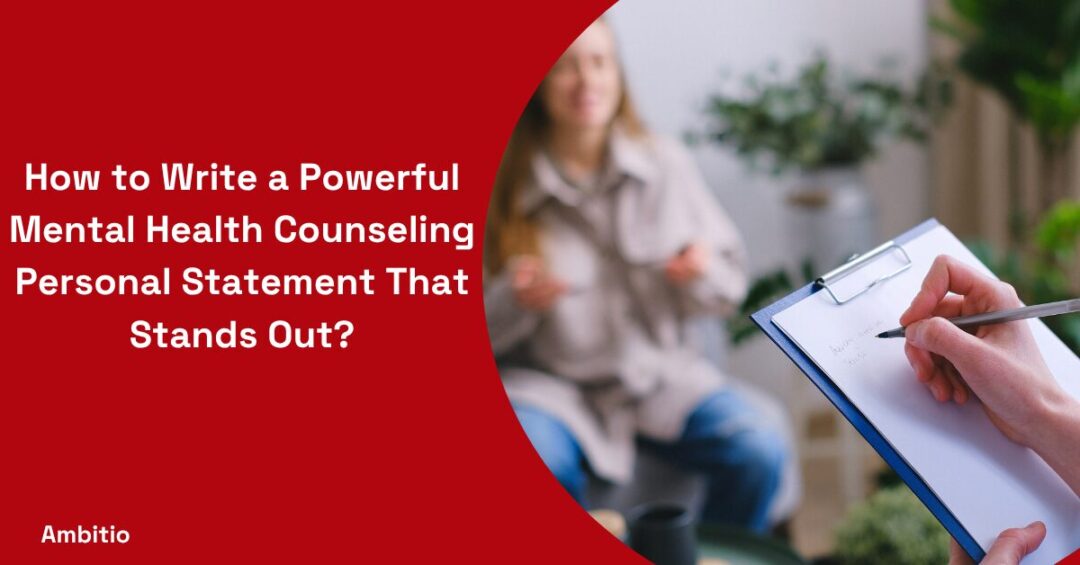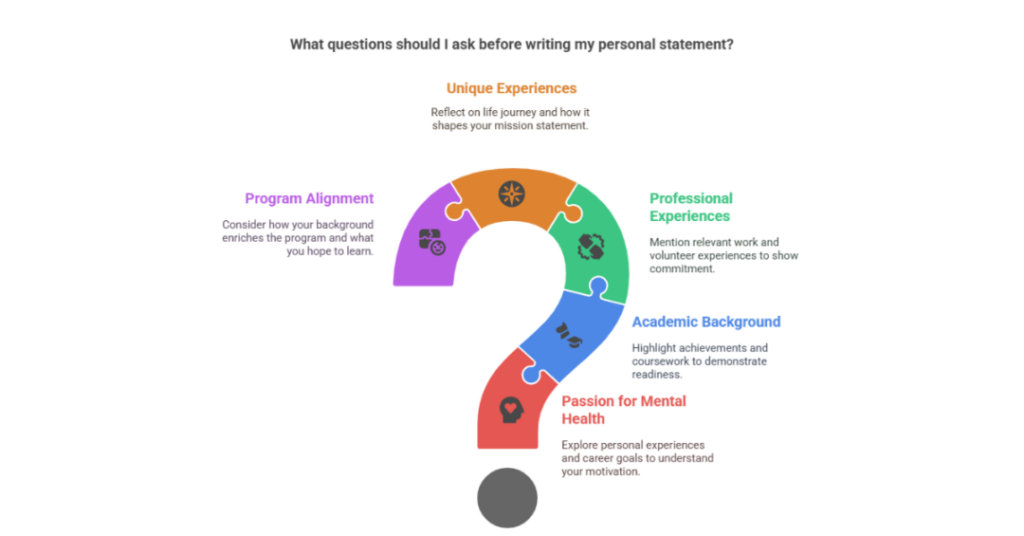14 May 2025
6 minutes read
How to Write a Powerful Mental Health Counseling Personal Statement That Stands Out?

Key Takeaways
- Mental health counseling personal statement should reflect your passion, personal experiences, and career goals, making it unique to you.
- Highlight your academic background, relevant work experience, and volunteer work to demonstrate your commitment and readiness for graduate school.
- Take the time to research your program and align your personal statement with the strengths of the specific counseling program you’re applying to.
Out of the more than 970 million people around the world who live with a mental health disorder, the demand for qualified mental health professionals far exceeds the supply. For Indian students applying to graduate programs outside India, the most overwhelming task when applying is often writing a mental health counseling personal statement.
You have to summarize years of love, pain, and purpose, without being overly dramatic or boring. The secret is to be yourself, be clear, and describe how your journey specifically gives you the capacity to serve in mental health.
What Is a Mental Health Counseling Personal Statement and Why It Matters?
A mental health counseling personal statement is a brief, focused personal essay that informs the admissions committee about who you are beyond your grades. If you are an Indian student, the personal statement will be an important part of the graduate school application that demonstrates your commitment to mental health, career aspirations, academic experiences, and the observations and realizations from your experiences.
The purpose of the statement is to provide programs with insight into who you are and what you will bring into the field of clinical mental health counseling. A strong personal statement can differentiate you in a competitive environment.
Important Questions to Ask Yourself Before Writing Your Mental Health Counseling Personal Statement
Before Indian students begin to write a personal statement for a counseling master’s or clinical psychology graduate program, it’s crucial to ask a few reflective questions.

These will help align your personal purpose with what admissions officers seek in a mental health counseling personal statement.
1. Why do I want to become a mental health counselor?
Explore your passion for mental health, what drew you to this field of mental health, and how it connects to your career goals. Consider personal experiences with mental health issues, family counseling, or group counseling.
2. What academic background and achievements support my application?
Think about your academic achievements, coursework in psychology and mental health, and any graduate studies that support your readiness for a master’s degree or graduate education.
3. What professional experiences or volunteer work have prepared me?
Mention relevant work experience, volunteer work, or exposure to mental health treatment. These help admissions committees see your commitment to becoming a successful graduate student in clinical mental health counseling.
4. How have my unique experiences shaped my mission statement?
Reflect on your life journey, how it connects to your sense of purpose, and how it will help you contribute to the counseling program. The best personal statements include vivid, unique experiences that show growth and direction.
5. What do I hope to bring to the program and learn from the counseling faculty?
Consider how your background can enrich the graduate school personal statement, and what you hope to learn from the counseling faculty. Are there aspects of the particular program that align with your career goals?
6 Steps to Write a Strong Mental Health Counseling Personal Statement for Application Process
Writing a mental health counseling personal statement is a crucial part of your application to grad school. For Indian students, crafting a compelling statement of purpose can make the difference in securing a spot in a master’s program.

Here are six essential steps to help you succeed:
1. Research Your Program and University
Before writing your personal statement, research the degree in clinical mental health counseling programs, such as those offered at the University of Florida, Boston University, or The George Washington University. Familiarize yourself with their best practices, faculty, and the specific requirements like IELTS, TOEFL, SAT, or GRE scores.
2. Reflect on Your Motivation and Experiences
Think about your personal experiences with mental health, psychology, and counseling. What draws you to the field of human mind? Your reflections will help build a meaningful psychology personal statement example that communicates your passion for the field.
3. Outline Your Personal Statement
Create a clear outline of your personal statement for graduate school. Structure it by covering your academic background, relevant experiences, and career goals. This will help you stay focused while writing and ensure a well-organized draft.
4. Draft Your Personal Statement
Start writing your personal statement based on your outline. Remember to highlight your academic achievements, volunteer work, and why you chose this specific master’s program. Your first draft should be fluid, don’t worry too much about perfection.
5. Review Your Draft
After completing your draft, take time for writing and editing. Look for areas where you can improve clarity, impact, and relevance. Avoid sounding too generic; make your story unique and compelling.
6. Finalize and Polish
Before submitting, make sure your personal statement aligns with the application materials. Double-check spelling, grammar, and formatting. Ensure your psychology personal statement reflects your true self and meets the expectations of the admissions committee at top universities like the University of Miami or University of Minnesota.
By following these steps, you’ll create a successful personal statement that stands out in the competitive grad school application process.
Key Elements to Include in Your Mental Health Counseling Personal Statement
When crafting your mental health counseling personal statement, especially for Indian students aiming to study abroad, certain elements will make your application stand out. Here are the key components to include:
Personal Motivation and Passion for Mental Health
Show your deep passion for mental health and what inspired you to pursue a career as a mental health counselor. Personal stories of experiences or challenges related to mental health issues will strengthen your narrative.
Academic Background and Achievements
Highlight your academic background, relevant coursework, and any research you’ve conducted in psychology or related fields. If applying to best universities in the UK for Indian students, emphasize your readiness for graduate studies.
Professional and Volunteer Experience
Showcase your work experience in mental health counseling or any relevant internships or volunteer work. This practical experience shows your commitment to helping others and prepares you for the master’s program.
Career Aspirations and Program Fit
Clarify your career goals and explain why the specific program, whether it’s clinical mental health counseling or psychology, is the right fit for you. Connect these goals with the strengths of the program at your chosen university.
Unique Personal Experiences
What makes you unique? Share experiences that differentiate you from other applicants, particularly how your background or perspective can contribute to the field of mental health.
Mental Health Counseling Personal Statement Example
Crafting a mental health counseling personal statement for University Application requires a balance of personal reflection, academic achievements, and career goals.
Below is a personal statement example of a strong opening paragraph and a guide on how to conclude with confidence.
An Example of a Strong Opening Paragraph
“As someone who has always been deeply moved by the struggles of those facing mental health issues, I am committed to pursuing a career in mental health counseling. From volunteering at local shelters to supporting peers through personal challenges, I have witnessed firsthand the transformative power of compassionate mental health care. My experiences have not only deepened my passion for this field but also motivated me to pursue a master’s program in clinical mental health counseling at a leading university, where I can further my understanding and skills to support others in their journey to healing.”
How to Conclude with Confidence
“In conclusion, my personal and professional experiences have solidified my desire to contribute to the mental health field as a dedicated counselor. I am eager to bring my academic background, hands-on experience, and passion for mental health to your program, where I hope to further develop my skills and make a meaningful impact. I am confident that your program will provide the right environment for me to thrive and achieve my career goals, and I look forward to the opportunity to learn from esteemed faculty and contribute to the growth of the mental health counseling field.
Conclusion
Your mental health counseling personal statement is your opportunity to showcase not only your academic background but also your passion and dedication to the field of mental health counseling. For Indian students applying to graduate programs abroad, it’s essential to craft a statement that reflects your unique journey and goals.
At Ambitio, we specialize in profile building and guiding you through the entire application process. Ready to make your mental health counseling personal statement stand out?
Let Ambitio Elite help you build your dream university with personalized guidance and expert support. Join us today and transform your application into a winning one!
FAQs
What is a mental health counseling personal statement?
A mental health counseling personal statement is a narrative essay that highlights your personality, career aspirations, and potential contributions to the field.
What should I include in my mental health counseling personal statement?
Include your motivation for pursuing mental health counseling, relevant experiences, personal values, and how your goals align with the program.
How personal should my mental health counseling personal statement be?
Your mental health counseling personal statement should be authentic, sharing personal stories and reflections that demonstrate your commitment and fit for the field.
Can I mention my own mental health challenges in the personal statement?
Yes, you can discuss your mental health challenges if they are central to your story, focusing on what you learned and how you’ve grown.
How long should my mental health counseling personal statement be?
Most programs expect a mental health counseling personal statement to be 500–800 words, organized and succinctly addressing key questions.
What common mistakes should I avoid in my mental health counseling personal statement?
Avoid clichés, excessive praise, and vague statements; use specific examples and maintain a professional tone.
How can I make my mental health counseling personal statement stand out?
Start early, stay organized, and clearly connect your unique experiences and aspirations to the counseling program’s mission.

You can study at top universities worldwide!
Get expert tips and tricks to get into top universities with a free expert session.
Book Your Free 30-Minute Session Now! Book a call now




























